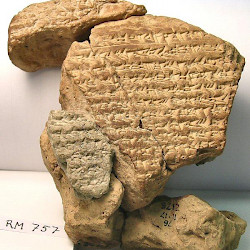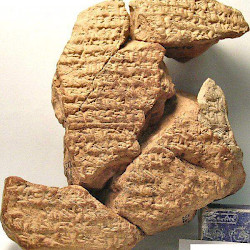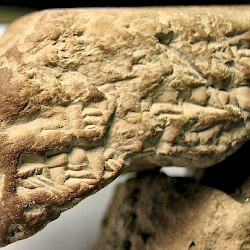BCHP 5 (Antiochus I and Sin Temple Chronicle)
The Babylonian Chronicle concerning Antiochus and Sin ("Antiochus and Sin Chronicle"; BCHP 5) is one of the Mesopotamian chronicles written in ancient Babylonia in the Hellenistic Period. It describes how the Seleucid crown prince Antiochus, the son of king Seleucus Nicator, sacrificed to the moon god Sin and resettled Europeans living in Babylon to Seleucia.
The Babylonian Chronicle concerning Antiochus and Sin ("Antiochus and Sin Chronicle"; BCHP 5) is one of the Mesopotamian chronicles written in ancient Babylonia in the Hellenistic Period. It describes how the Seleucid crown prince Antiochus, the son of king Seleucus Nicator, sacrificed to the moon god Sin and resettled Europeans living in Babylon to Seleucia on the Tigris. The cuneiform tablets (BM 32440 + 32581 + 32585 and others) are in the British Museum.
On this webpage, a new reading is proposed; the official publication will be in I.L. Finkel, R.J. van der Spek, R. Pirngruber, Babylonian Chronographic Texts from the Hellenistic Period (2020; = BCHP; Writings of the Ancient World).
Previous editions
- Grayson 1975 (ABC no. 11): 119-121, photo’s Plate xix; copy plate I;
- Glassner 1993 (CM no. 32): 210-211;
- Del Monte 1997 (TBE): 194-197.
All editions, except Glassner’s, are based on Rm 757 + BM 32440 + 32581 + 32585; the other fragments have been joined by Irving Finkel.
Description of the tablet
The tablet is certainly a one-column tablet. The upper left edges are preserved, the right edge is missing, but not many signs are missing at the end of lines 7 and 8. The thickness at the upper edge is 2.5 cm, at the broken middle edges 4.2 cm. The bottom edge is broken; the thickness there is 3.8 cm. Hence, more than half of the tablet is preserved. The length of the tablet is 11.8 cm, the width 11.5 cm. The original tablet measured approximately 15 x 12 cm.
The tablet has the same crude handwriting as the other tablets concerning the Crown Prince (i.e., the Antiochus and India and Juniper Garden Chronocles).
 BCHP 05: Antiochus and Sin Chronicle (RM 757), Obverse |
 BCHP 05: Antiochus and Sin Chronicle (RM 757), Reverse |
 BCHP 05: Antiochus and Sin Chronicle (RM 757), Top, left |
The Foundation of Seleucia
This statement about the founding of Seleucia on the Tigris (reverse 6'-10') is of the utmost importance. It means that Antiochus, the crown prince, deported the Macedonian colonists and/or soldiers, who lived in Babylon, and forced them to resettle in Seleucia. This puts the old question of the policy of the settlement of Babylonians into Seleucia into a new light. The classical text in this is a remark by Pausanias, who enumerates examples of Seleucus' piety:
Secondly, when he founded Seleucia on the river Tigris and brought to it Babylonian colonists, he spared the wall of Babylon as well as the sanctuary of Bel, near which he permitted the Chaldaeans to live.note
This passage has often been used to underline the decline of Babylon, in combination of other passages which stress the fact that Babylon declined after the foundation of Seleucia.note
The other text which is often mentioned as a testimony of the forced migration of Babylonians to Seleucia is Astronomical Diary I, p. 345, no. –273 B : 35’-36’ (12. XII. SE 37 = 26 March 274 BCE). Hunger's edition made clear that a migration was not at issue, rather the sending of an embassy of Babylonian members of the Temple Council, three days after messages of the king form Sardes arrived (cf. Van der Spek 1993b: 97-98).
It cannot be denied that Babylonians moved to Seleucia, since this is attested by the finds of several cuneiform tablets in Seleucia.note The tablet published by Doty concerns the dedication of a temple slave by a person with a Greek name dated to 87 SE (= 225/4 BCE) to the Nergal temple of Cuthah. The place name is lost in the dating formula, but it may well have been Cuthah. Oelsner assumed that the dedicator was a Greek on the basis of his name. This conclusion is not necessary. Many Babylonians with Greek names are attested in Hellenistic Babylonia.
Now it seems more likely that it was Seleucus' first intention to found a primarily Macedonian city, to which end all (mala ša) Macedonians who lived in Babylon were forced to move to Seleucia. After this date Macedonians and Greeks were not encouraged anymore to settle in Babylon, and as I have argued earlier,note Babylon remained a primarily Babylonian city. It was only Antiochus IV Epiphanes who again started a Greek colonising policy in Babylon, as is now confirmed by the Greek Community Chronicle (= BCHP 14).
The Macedonians in question will have been the soldiers, who were established there by Alexander the Great. Alexander had left a garrison in Babylon when he arrived therenote led by Apollodoros of Amphipolis and Menes of Pella. Agathon of Pydna was in charge of the 700 Macedonians who guarded the "citadel" of Babylon. The garrison still existed in the days of the rule of Antigonus Monophthalmus (315-311 BCE): Diphilos was appointed garrison commander.note During the Babylonian WarBabylonian War between Antigonus and Seleucus (311-307), described in the Diadochi Chronicle (BCHP 3 = ABC 10), the garrison was still there.
Obverse
[Obv.1] /Year 20+5?, month Ulûlu (VI)\. That month A[ntiochus, the crown prince..........]
[Obv.2] in the city of Bašî above the city […… .]
[Obv.3] Month Tašrîtu (VII). That month a certain ..[...........]
[Obv.4] [.. .. .. .. .. .. ..]/ x x \ [.. .. .. ..] /x x x\ [.. .. .. ..]
[Obv.5] [..........] That year debris of Esagi[la was (not?) removed]
--------------------------------
[Obv.6] [Year .., month ..]. That month, the 20th day, Antiochus, the [crown] prince
[Obv.7] [entered Babylon. Day 2]7, [they moved] the animals to the [east (or: west)] side (of the river) to outside regions/for putting out to pasture.
[Obv.8] [Month .., ..]th [day], the crown prince at the instruction of a certain Bab[ylonian]
[Obv.9] [performed] regular [offerings] for Sin of Egišnugal and Sin of Enit[enna].
[Obv.10] [Antiochu]s, the son of the king, [entered] the temple of Sin of Egišnugal and in the tem[ple of Sin of Enitenna]
[Obv.11] [and the s]on of the king aforementioned prostrated himself. The son of the king [provided] one sheep for the offering
[Obv.12] [of Sin and he bo]wed down in the temple of Sin, Egišnugal, and in the temple of Sin, En[itenna].
[Obv.13] [That month, the son of the king] departed [fr]om Babylon to Bit Gura. Month [ ... That month]
[Obv.14] [the epi]states? [led] his troops out[of] Seleucia
[Obv.15] [to .. .. .. ..] towards the king [ .. ..]ku anoi[nted? .. ..] /Month\ [.. . That month .. .. ..
[Obv.16] [.. .. .. .. ..] gold [.. .. .. .. .. .. .. .. .. .. .. ..]
[Lacuna of about fifteen lines.]
Reverse
[Rev.1'] [Lacuna of about four lines]
[.. .. .. .. .. .. Month Kislîmu (IX). That month], 28th day, water in[to .. .. ..]
[Rev.2'] [.. .. Month Tebêtu (X). That month], 28th day, P[ol]yteudas?, the Greek,
[Rev.3'] [.. .. .. .. .. ..]. Month Šabatu (XI). That month, [day 2]8th, Antiochus, the son of the king,
[Rev.4'] [.. .. .. .. .. ..] the herdsman[. .. ..] to the city of Bit Gur[a’ .. ..]
[Rev.5'] [.. .. .. .. the anima]ls on the [east (or: west)] side [.. .. .. .. .. .. .. .. .. ..]
[Rev.6'] [Month ..]. That month Antiochus, the crown [prince],
[Rev.7'] settled [the Mace]donians, as many as there were in Babylon, [whom king Alexander?]
[Rev.8'] [into Babylon] had forced to enter, from Babylon [into Seleucia]
[Rev.9'] [which is o]n the Tigris. .. [.. .. ..] x [.. .. .. ..]
[Rev.10'] [.. .. .. ..] x a heavy taxation (share of the yield) upon Babylon [he imposed]
[Rev.11'] [That month, Antio]chus, the crown princ[e .. .. ..] .. .. [.. ..].
--------------------------------
[Rev.12'] [Year x, mo]nth Arahsamna (VIII). That month, the 20[+th] day. [Fro]m? 10 pure sheep [.. .. .. .. ..]
[Rev.13'] [.. .. .. ] as ration? to the Babylo[nians. Fro]m? the 10 sheep aforementioned [.. .. .. ..]
[Rev.14'] [they provid]ed?; within [Esa]gila /to Bêl, Nabû and Bêltia(?)\
[Rev.15'] [.. .. .. .. ..] .. É [.. .. ..] day 22t[h .. .. .. .. .. .. .. .. ..]
[Rev.16'] x [.. .. .. .. .. .. .. .. ..]. That month, day [..th, .. .. .. .. .. .. .. ..].
[Rev.17'] The people of the land x[ .. .. ..] .. .. .. .. [.. .. .. .. .. .. .. .. ..]
[Rev.18'] [Month .. . That month], 18th day of month [.. .. .. ] .. .. .. .. [.. .. .. .. .. .. .. ..]
[Rev.19'] Month Šabatu (X). That month, on an unknown day, PN[.. .. .. .. .. .. .. .. .. .. .. .. .. .. .. ..]
[Rev'.20'] /to\ Seleucia [.. .. .. .. .. .. .. .. .. .. .. .. .. .. .. .. .. ..]